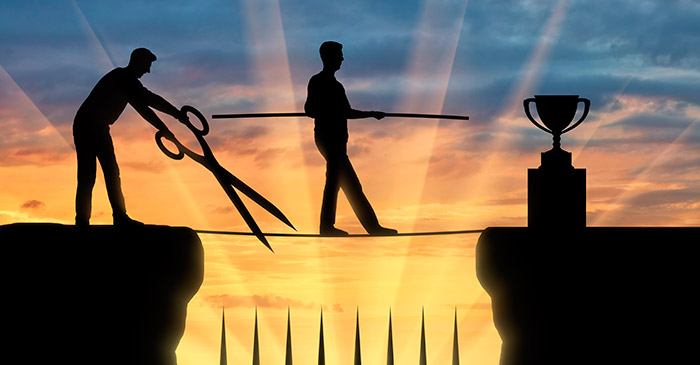
Envy has a new mask. Let us call it competition. The competitive instinct starts with such harmless thoughts as ‘What about me?’ or ‘Why not me?’ Slowly the seeds of these thoughts sprout to become a national epidemic. In a self-centered universe, self-image is a consumable item. The more images of myself that I experience and consume, the greater I seem to feel.
A few months back I was wading through a massive crowd of people in Times Square, New York. Many of the visitors were precariously posing to shoot their pictures on mobile devices in peak traffic. Some of them could easily have been bumped off by a speeding car. Instead of shooting photographs, they could have ended up as post mortem images. You could call this the suicidal selfie syndrome. I believe 2014 was declared the Year of Selfie. Priceonomics, a data service provider noted that 19 people were killed since 2014 in India while taking selfies, accounting for 40% of all selfierelated deaths in the world. In 2015, more people were killed taking selfies than by shark attacks, the Wikipedia says.
Many corporations have reduced the beauty and multi-dimensionality of the human being to a one-dimensional economic man. An economic man is valued by how much he makes rather than what makes him human. Money becomes the most significant measure of achievement. Relative differences in performance are often compared in money terms. Net income shapes gross behaviour. Workers get drunk when promoted; they also get drunk when not promoted. Neurotic insecurity, in turn, affects selfevaluation and self-image of the performers. Financial inequities trigger social comparisons and spasms of envy. What distinguishes a human being from a cow is financial worries. No cow, unless one is referring to a two-legged cash cow, will be envious of incremental money matters pertaining to a fellow cow. Nor will she engage in round stable bitching or cubicle comparisons. Those who consider money as vulgar disguise their envy by embracing the philosophy of sour grapeism!
Here is a war of words between Apple and Microsoft that tells us how the economy of envy has come to stay:
Notice on entry gate of an Apple Store in New York: "Don't ever fart here; the smell will stay for ages. We don't have Windows" There was a Tit for Tat from Microsoft in their premises: "Anyone visiting us here can be free to use Windows in case you need to release stale gas from yesterday's half eaten Apple. We have been providing open window systems to the world since ages"
Oxford University’s Daniel Zizzo and Andrew Oswald of Warwick University crafted a series of experiments in which groups of four people were given nearly equal sums of money. The four had to gamble with their new wealth in random, computerised bets; two came out each time with more cash, and two with less. Richer or poorer, each was then given the chance to spend his money to reduce the take of his fellow subjects. There was no prospect that this would make him any richer. Indeed, it would cost him anywhere from two to 25 cents for every dollar destroyed that belonged to his fellow players. The professors were shocked to find that even at the price of 25 cents for every dollar burnt, 62% of the participants paid for the privilege of bringing down their peers.
Envy weaves its spider’s web in bedrooms as it does in boardrooms. There is a lot of unpublished and spicy evidence of this. However, there is no better researcher on the subject of conjugal envy than a suspicious spouse. Children born of envious parents carry the seeds of comparison in the form of sibling rivalry. Children between years 0-5, with all their innocence, begin by trusting what their parent tell them; then between 5-15 they judge their parents and beyond 15 children never stop grudging their parents for comparing them with each other. Like a shining metal is corroded by its own rust, envy poisons the finest mettle in a human being and destroys his humanity.
Envy has an economic cost to it. Competition may bring the best out of a product, but sometimes it brings out the worst in a human being. Organizations that create yawning gaps between winners and losers pave the royal path to envy. Many years ago a brand of television used to advertise their product as, Neighbour’s envy, owner’s pride. They haven’t made too much headway since then as a company.
I started by saying that envy always wears a mask. Next time when you hear a colleague congratulating you on your promotion with his teeth clenched, remember that he may simply be sugar-coating his envy. For all you know, he loves your chair and hates you in equal measure! The only time envy works for you is when you grow out of it. Consider yourself an evolved being if you have grown from envy to admiration; from flattery to genuine praise, and finally from imitation to emulation.